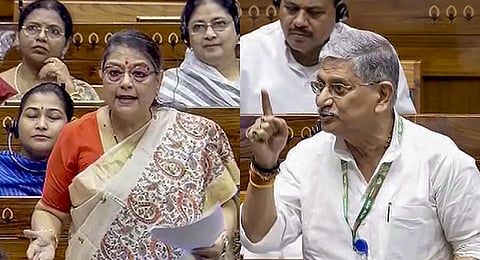

Most of the smaller parties, including JDU, BRS, CPI and YSRCP came out in support of the new women reservation bill on the first day of discussions in parliament today, but also alleged that it’s a spurious bill that will not result in any actual reservations for several years to come.
Several parties who supported the idea of reservations for women questioned the government’s bona fides, alleging that the bill has been written in such a way that it will not come into effect before the elections, or even for many years. India is scheduled to have general elections in April-May next year. There was ruckus in the house after a copy of the bill was not given to the opposition parties in advance.
One of the parties that expressed support for the bill, but also questioned the government’s intent, was JD(U). Rajiv Ranjan Singh of the JD(U) called the bill a “panic reaction” against the formation of the opposition front, and an “election gimmick”.
Meanwhile, BRS, led by K Chandrashekar Rao, came out in full support of the bill. Nama Nageswara Rao who spoke for the party pointed out that the implementation of the bill should not be delayed any further.
“The elections are coming. We demand the immediate implementation of the bill. Otherwise the government should at least mention the time frame for delimitation and census as mentioned in the bill,” he said.
CPI on the other hand has pushed for 50% reservation for women. K Subbarayyan speaking for CPI pointed that the party refuses to respect this bill as it lacks clarity and would be ineffective.
He alleged that the government isn't interested in giving equal rights to women. “Not 33%, Communist party of India believes women should be given 50% reservation,” he said.
“Even then why we don't respect this bill is because we have no idea when this will become law. The census was not conducted in 2021, the government has no clarity about when it is going to conduct a census..” he said.
“Next census might happen in 2031. Which means after the 2024 elections, there is no chance of the bill being implemented until 2029. It gives the idea that the government will only start thinking about implementing it post 2034,” he added.
YSRCP is another party that has expressed support for the bill.
Speaking for the party, Dr. B Venkata Satyavathi observed that the new women reservation bill carries the “promise of empowering women and advancing the cause of gender equality in the political sphere”.
Major opposition parties including Indian National Congress and DMK supported the bill but raised concern regarding the delay in its implementation.
DMK MP Kanimozhi criticized the government for introducing the bill without necessary consultation with the opposition.
"I would like to know what consensus was built... what discussions were held. This bill was brought shrouded in secrecy... we did not know why this (special) session was called for. At the all-party leaders' meeting there was no mention of this bill... I don't know if any of the political leaders were called for deliberations. Suddenly the bill popped up on our computers... like a jack-in-the-box" , she said.
Senior congress leader Sonia Gandhi pointed out that any further delay in the implementation of the bill is a blatant injustice against women in India. She also pushed for reservation for women belonging to SC, ST, OBC communities.
“The Indian National Congress demands that this bill be operationalised immediately. Along with that, caste census should be conducted to ensure reservation for women from Scheduled Castes, Scheduled Tribes and OBCs… The government should take those steps needed to make it a reality…any further delay in the implementation of the bill is a blatant injustice against women in India”, she said.
Going By Past Record
The Indian National Congress has been one of the biggest supporters of the bill since it was first introduced in 1996 under the United Front government. Under UPA-I and UPA-II, the Congress made several attempts to pass the bill but could not build consensus. In 2010, the bill was passed in the Rajya Sabha but lapsed after the dissolution of the 15th Lok Sabha.
Regional parties like the Trinamool Congress, Biju Janata Dal, and YSR Congress have also extended support to the bill at different points of time. However, the Trinamool Congress wanted a separate quota for minority women within the 33% reservation. Some other regional parties like Samajwadi Party, Bahujan Samaj Party and Rashtriya Janata Dal have also supported the bill while negotiating for sub-quotas.
The BJP initially opposed the passage of the bill when it was in the opposition during the UPA rule. It viewed the bill as a political gimmick though many of its leaders personally supported quota for women. After coming to power in 2014, the BJP has indicated changing its stand and showing openness to pass the bill if there is a larger consensus.
Parties like the CPI(M) and the CPI have consistently supported the passage of the women's reservation bill. They have demanded that the bill be taken up on priority and passed in Parliament.
On the other hand, parties like the AIADMK, Telugu Desam Party and the All India Anna Dravida Munnetra Kazhagam (AIADMK) have opposed the passage of the bill in its current form. They have demanded quota for women at the district and town levels, and within political parties as well.
Some other regional parties like the Shiromani Akali Dal have also opposed the bill at times due to demands for sub-quotas for minority or OBC women. The opposition is based more on the premise of inadequate representation for their core voter bases.